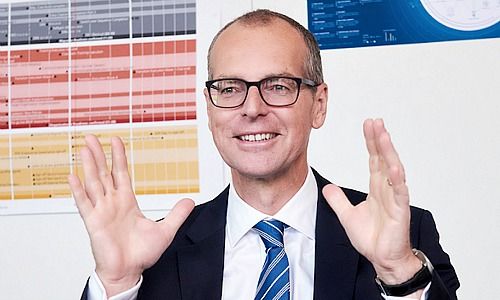Dirk Klee: «We Built Sort of iPhone»
How was Smartwealth's first year?
Robo advisory and digital wealth managers in general aren't a mass phenomenon yet. With UBS Smartwealth, we're just trying to be at the forefront of technological advancement, instead of leaving the area to fintechs. The same applies to any promising technology like blockchain or artificial intelligence. UBS sees itself as a tech firm.
What can Smartwealth do that other robo advisors can't?
It isn't a blueprint of American robo advisors Betterment or Wealthfront. Instead, users can develop very differentiated investment targets. For example: I want to buy a house in ten years. Or, I'd like to take early retirement. Smartwealth is a kind of financial planner.
And it mainly offers UBS products?
No. We only offer our own products – and this doesn't just apply for UBS Smartwealth – if we can demonstrate that they are as good or better than the competition. We call this «guided architecture,» unlike «open architecture,» which contains no own products at all.
Who decides on the products' merits?
An centrally-organized investment body within the bank.
Wouldn't it be better for UBS' credibility to delegate the product selection to outside of the bank?
We treat our own products exactly the same as outside ones, and evaluate them along various quantitative and qualitative criteria. If ours is as good or better, we take it. If not, we choose a third party's product.
Next year, the European Payment Services Directive, or PSD2, comes into force, which requires banks to open their API portals. Switzerland will eventually also have to comply with this. Is this a big threat for banks?
I look at things through a global prism, and have spent a lot of time on this topic. There may be the threat that global platforms like Google, Amazon or Tencent use their APIs to sideline banks in their current set-up. Google & Co will certainly offer financial services in the future.
What is UBS doing to prevent its business model from being disrupted?
We want to belong to the global platforms which offer our own but also third-party financial services. We've laid the foundation with the One Wealth Management Plattform. Developments may take us towards an open banking system, where we still decide which services we provide and which third-party services we allow into our ecosystem.
Then you still maintain control. The problem is that a wealthy client from Germany for example could require UBS Europe to provide access to an independent wealth manager.
Yes, there is that option. We will have to face this challenge and continually convince our clients of our quality. If they see us primarily as a custodian bank, then he or she doesn't appreciate the value we can create. But that client could walk away even without the effect of PSD2. I don't believe wealthy clients come to us merely deposit money, but for advice.
But the pressure under PSD2 will only increase.
Absolutely. The race is undecided. But quality investment advice has its price. It's not enough to aggregate data and develop financial products on the basis of that. Fintechs will have to establish themselves through better investment advice.
I was in the U.S. recently and looked at several robo advisors. The interesting thing is, nearly all purely digital robo advisors have effectively failed and are beginning to hire client advisors. Ultimately, robo advisors approach the idea from the other side – the digital one – and have to acknowledge that wealth management requires flesh and blood. Are fintechs better equipped for the future than we are, as we add digital tools to a more personalized investment advisory? Time will tell.
Dirk Klee joined Zurich-based UBS as the operating chief for its private bank in 2013. The 52-year-old lawyer is responsible for rolling out a digital strategy for UBS' private bank. Before he joined the Swiss bank, he was head of Blackrock in Germany for five years. Prior to the U.S. asset manager, Klee ran Allianz's fund distribution in Germany and Austria.
- << Back
- Page 2 of 2



























